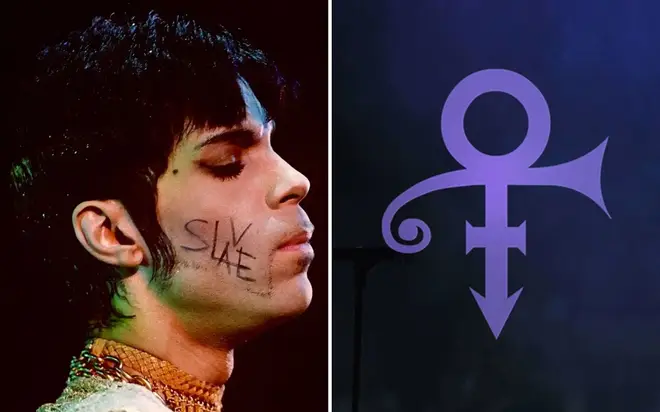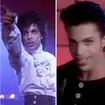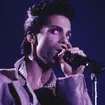Why did Prince change his name to a symbol?
8 April 2022, 16:23 | Updated: 14 April 2022, 11:53

Musicians and artists aren’t often scared to break boundaries.
In fact, you could say it comes with the territory to surprise people and do the unexpected.
And it can safely be said that nobody expected Prince, one of the world’s biggest ever superstars, to change his name to a symbol.
It was at the height of his fame that he chose not to be referred to as Prince, rather ‘The Artist Formerly Known As Prince’ which both baffled and bemused fans and critics alike.
Away from the R&B virtuoso’s music, the name change is arguably what Prince is remembered for most.
But what were the reasons behind it? Here’s all you need to know:
- Incredible unearthed footage shows 11 year-old Prince arguing for better pay for teachers
- The 10 greatest Super Bowl halftime performances ever from Michael Jackson to Prince

Prince Sings Purple Rain At The Superbowl Halftime Show
When did Prince change his name?
Prince revealed that he had changed his name in 1993.
Though Prince was immensely famous, he hadn’t had a hit album since he wrote the soundtrack to 1989’s Batman, which reached No.1 in the Billboard Album Charts.
In the years after, critics frequently gave his records mixed reviews and nothing seemed to quite capture the fanfare of his previous work.
Then Prince announced he was changing his name to the ‘love symbol’ associated with his music, which people initially thought was just an attention grabbing headline.
- Prince's estate release stunning track ahead of much anticipated 'Welcome 2 America' album
- Prince facts: Iconic singer's career, real name, height, girlfriends and death explained
- QUIZ: How well do you know the lyrics to Prince's 'Purple Rain'?

Prince gives inspiring life advice on New Girl
Did Prince change his name to a symbol as a publicity stunt?
Not quite. There was a much bigger reason for Prince changing his name than just to stir up media outlets.
But it did result in a lot of negative press as you could imagine, not just for Prince himself but also his record label Warner Bros.
As one of Warner Bros’ top-tier artists and selling millions of records worldwide, their biggest asset going on to receive unwanted attention almost overnight must’ve worried the label somewhat, especially as he wasn’t hitting the kinds of commercial success of previous years.
Prince was clearly committed to the name change, as he referred to himself as ‘The Artist Formerly Known As Prince’ or simply ‘The Artist’ until his mainstream reemergence in 2000.
- Shalamar and Smooth's Angie Greaves recall night they found out Prince died - video
- The Story of... 'Purple Rain' by Prince

Prince on Sesame Street
Did Prince change his name to a symbol because of a dispute with his record company Warner Bros?
The sole reason Prince changed his name was because of a long-running dispute with Warner Bros.
Throughout his career Prince was incredibly prolific - from his 1978 debut For You up until 1993, he released an album every year with the exception of 1983.
He had a vault of a reported 500 unreleased songs and projects, as well as over 50 unused music videos at the time of his death.
And this is what Warner Bros saw as the problem: he had too much music to release, and they were concerned about oversaturating the market with too much Prince. In retrospect, it sounds almost unbelievable.
Hinting at the love loss between artist and label, Prince would regularly perform with ‘SLAVE’ written on his cheek. But changing his name entirely turned up the heat just a notch.
In a statement at the time, the legend said: “Prince is the name that my mother gave me at birth. Warner Brothers took the name, trademarked it, and used it as the main marketing tool to promote all of the music I wrote.”
“The company owns the name Prince and all related music marketed under Prince. I became merely a pawn used to produce more money for Warner Brothers.”
He explained quite plainly that: “The first step I have taken towards the ultimate goal of emancipation from the chains that bind me to Warner Brothers was to change my name from Prince to (symbol).”
Changing his name was a brave and bold way to manoeuvre out of his contract, so he had more control over what music he released and when.

Prince talks Music ownership "What do you really need Record Companies for"
What impact did Prince changing his name to a symbol have?
Initially it caused the disruption Prince was hoping for, but it still took him years to get out of his contract, even after agreeing to release a Greatest Hits compilation.
In the long run though, the ‘love symbol’ (a supposed mix between the male and female love signs) helped start a conversation about representation and identity, given that Prince maintained an androgynous persona throughout his career.
The notorious name change, no matter how much negative publicity it received, solidified Prince’s position as pop music royalty.
It was one of the most high-profile examples of a musician standing up to the major label executives for artistic control, and personal freedom.












